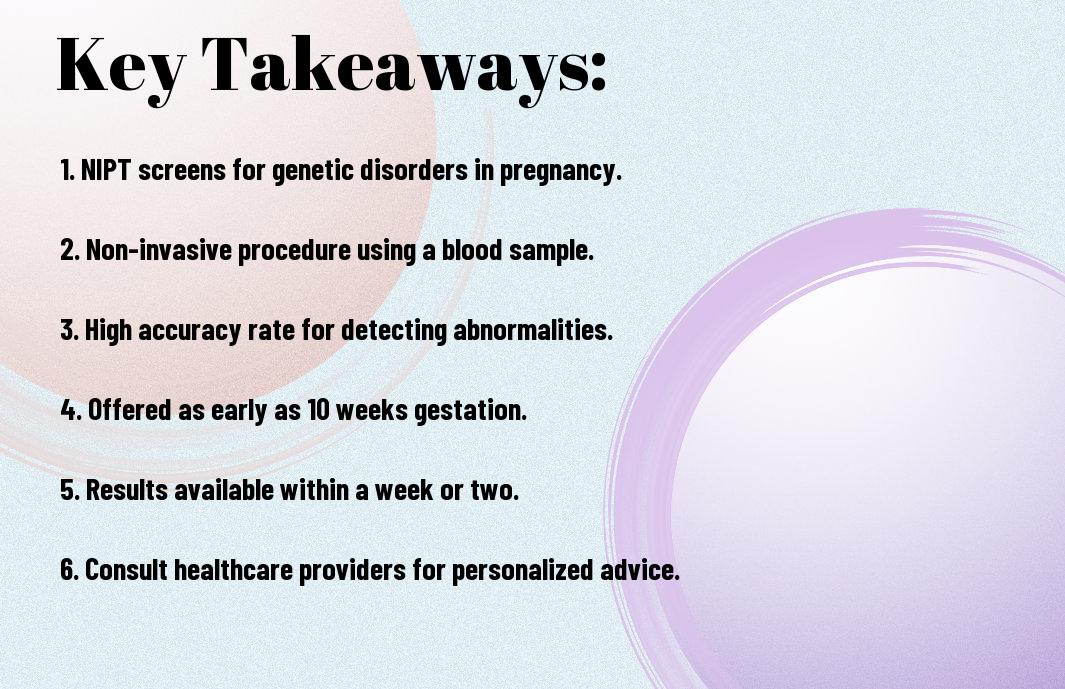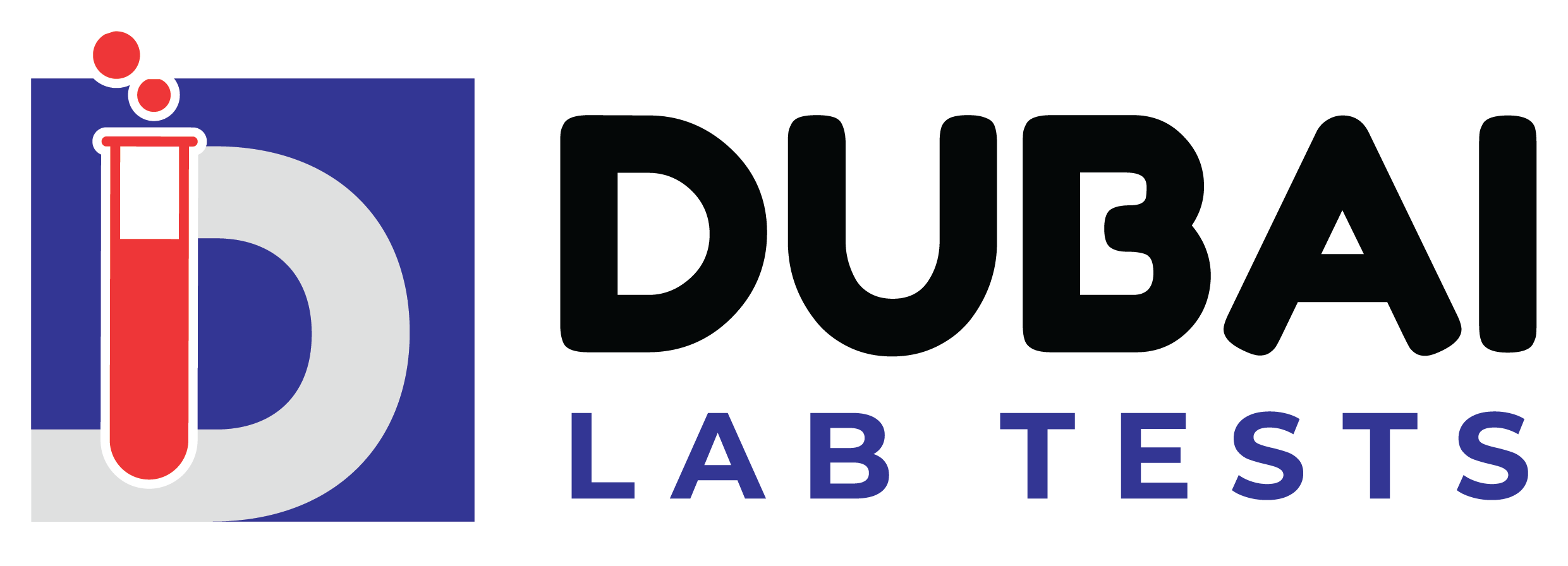Parents in Dubai often seek comprehensive information about the NIPT test as they prepare for the arrival of their little one. This non-invasive prenatal test provides early insights into potential genetic disorders, allowing you to make informed decisions about your pregnancy. Understanding the benefits and limitations of the NIPT test can empower you to discuss options with your healthcare provider effectively. Furthermore, knowing how the test is conducted and what the results mean is vital to navigate this important stage in your journey to parenthood.

Key Takeaways:
- NIPT Overview: Non-Invasive Prenatal Testing (NIPT) is a blood test that assesses the risk of certain genetic conditions in the fetus, primarily focusing on chromosomal abnormalities such as Down syndrome.
- Testing Accuracy: NIPT boasts high accuracy rates for detecting common conditions, making it a reliable choice for parents seeking early insights into their child’s health.
- Timing of Testing: This test can typically be performed as early as the 10th week of pregnancy, allowing parents to receive important information sooner rather than later.
- Implications of Results: While NIPT can provide valuable information, positive results do not confirm a condition; follow-up tests may be recommended for definitive diagnosis.
- Availability in Dubai: NIPT is widely accessible in Dubai, with various healthcare providers offering the test to expecting parents, ensuring they have options for prenatal care.

What is NIPT?
Before entering into the specifics, it’s important to understand that the Non-Invasive Prenatal Testing (NIPT) is a revolutionary screening method designed to assess the likelihood of certain genetic conditions in your unborn baby. This test uses a simple blood draw from you to analyze fragments of fetal DNA circulating in your bloodstream.
Definition and Purpose
What NIPT does is provide early detection of potential chromosomal abnormalities such as Down syndrome, trisomy 18, and trisomy 13, among others. Unlike traditional screening methods, NIPT is highly accurate, allowing you to make informed decisions about your pregnancy based on the results.
How NIPT Works
Around ten weeks into your pregnancy, a simple blood test can be conducted to analyze fetal DNA present in your bloodstream. This test compares the genetic information from your blood to specific chromosomes, detecting any abnormalities. The results are typically available within a week, offering you peace of mind during a critical stage of your pregnancy.
Considering the advancements in genetic testing, NIPT stands out for its high accuracy rate in identifying conditions like Down syndrome, making it a preferred choice for expecting parents. It provides less invasive options compared to procedures like amniocentesis or chorionic villus sampling, significantly reducing the risk of complications. However, it’s necessary to consult your healthcare provider, as while NIPT is highly reliable, a positive result may still require further testing for confirmation.
Who Should Consider NIPT?
One of the most progressive options for prenatal screening is Non-Invasive Prenatal Testing (NIPT). This test is generally recommended for expecting parents who want to assess the risk of chromosomal abnormalities in their unborn child. You may find Understanding the NIPT Test for Pregnancy in Dubai helpful in deciding if this test is right for you.
High-Risk Pregnancies
Across many healthcare scenarios, NIPT is especially beneficial for parents classified as high-risk due to factors such as advanced maternal age or a family history of genetic disorders. This test offers a non-invasive means to gather imperative information that could guide your pregnancy management and prepare you for any required interventions.
General Population
For many expecting parents, including those not classified as high-risk, NIPT is a valuable tool for peace of mind. The test can help identify potential chromosomal issues earlier in your pregnancy, allowing for informed decisions.
In fact, considering NIPT as a part of your prenatal care can significantly enhance your experience. This testing method is non-invasive and poses no risk to you or your baby, providing you with accurate results regarding conditions like Down syndrome. By opting for NIPT, you take a proactive step towards understanding your pregnancy journey, ensuring a healthier start for your child.
Types of Conditions Detected
Keep in mind that the NIPT test can identify various conditions that may affect your baby. Some of the key conditions it can screen for include:
| Trisomy 21 (Down syndrome) | Most common chromosomal condition |
| Trisomy 18 (Edwards syndrome) | Serious condition often resulting in miscarriage |
| Trisomy 13 (Patau syndrome) | Severe complications, high mortality rate |
| Sex chromosome aneuploidies | Conditions like Turner syndrome |
| Microdeletions | Smaller genetic changes associated with disorders |
This test provides you with valuable insights into your baby’s health. It is important to discuss the results with your healthcare provider for proper interpretation and next steps.
Chromosomal Abnormalities
With the NIPT test, you can detect significant chromosomal abnormalities that may affect your baby’s health. These include conditions like Trisomy 21, Trisomy 18, and Trisomy 13. Early detection can help you make informed decisions and prepare for potential challenges.
Other Genetic Disorders
Along with chromosomal abnormalities, the NIPT test can identify various other genetic disorders. These include health issues related to microdeletions and sex chromosome aneuploidies, which may affect development and fertility.
Indeed, identifying other genetic disorders can be life-altering for you and your family. Early detection opens up pathways for early intervention and specialized care, significantly impacting your baby’s long-term health. Understanding these conditions enables you to work closely with your healthcare team, resulting in informed choices and support tailored to your family’s needs.
Advantages of NIPT
Your journey to parenthood can be filled with joy and anticipation, but it can also bring concerns regarding your baby’s health. The Non-Invasive Prenatal Testing (NIPT) provides several advantages, offering peace of mind by identifying specific genetic conditions early. This advanced test allows you to make informed decisions and prepare for your baby’s arrival, ensuring a smoother experience during pregnancy.
Non-Invasive Nature
After undergoing NIPT, you can feel reassured knowing that it is a non-invasive procedure. It involves only a simple blood draw from you, which means there is no risk of complications often associated with invasive tests like amniocentesis or chorionic villus sampling. This characteristic makes NIPT a safer choice for you and your baby.
Accuracy and Reliability
After engaging with the NIPT test, one of the most appealing benefits you will discover is its high accuracy rate. Studies show that NIPT offers over 99% accuracy in detecting conditions like Down syndrome and other chromosomal abnormalities, providing you with reliable results that you can trust. This exceptional accuracy helps you make empowered decisions regarding your pregnancy.
Non-Invasive Prenatal Testing is characterized by its extraordinary accuracy and reliability, often exceeding that of traditional screening tests. With a detection rate of over 99% for Down syndrome and a significantly reduced false-positive rate, you can approach your pregnancy with confidence. This selection empowers you to address any potential health concerns early, allowing for better planning and support when needed. Whether you choose to opt for further diagnostic tests or just seek reassurance, NIPT serves as a valuable tool in your maternal journey.

Limitations and Considerations
Unlike traditional prenatal tests, the NIPT is not diagnostic and should be considered as a screening tool. You should understand that while it offers a higher accuracy rate for detecting certain genetic conditions, it is not infallible and may not encompass all potential anomalies. Decisions regarding further testing should be made thoughtfully, considering both medical advice and personal circumstances.
False Positives and Negatives
Any screening test, including the NIPT, can yield false positive and false negative results. A false positive may indicate a risk for a condition that is actually not present, leading to unnecessary anxiety or further invasive testing. Conversely, a false negative might fail to identify a condition that is present, causing you to overlook necessary care. It is vital to discuss these possibilities with your healthcare provider.
Ethical Implications
At the forefront of medical decisions surrounding NIPT are ethical implications that demand your attention. You must consider how results can impact your pregnancy, potential termination decisions, and even parental choices moving forward.
Consequently, understanding the ethical landscape surrounding NIPT is crucial for making informed choices. You may face decisions that touch on sensitive topics, such as the termination of a pregnancy based on test outcomes. These results can also create emotional strain and influence relationships with partners and family. Engaging in open conversations with your healthcare provider about your values, beliefs, and concerns is vital in navigating these complex issues while ensuring you have the support you need.
The NIPT Process in Dubai
Now that you understand the significance of Non-Invasive Prenatal Testing (NIPT), it’s crucial to familiarize yourself with how the process unfolds in Dubai. From initial consultation to receiving results, the NIPT process is designed to be straightforward and supportive. You will typically start with a consultation with your healthcare provider, who will guide you through the options available. The test itself involves a simple blood draw, performed after the 10th week of pregnancy, making it a convenient option for many expecting parents.
Availability and Accessibility
On the ground in Dubai, NIPT is widely available at numerous healthcare facilities, including hospitals and specialized clinics. These institutions usually have the necessary infrastructure to conduct the test efficiently. Given Dubai’s advanced healthcare system, you may find no significant barriers to accessing NIPT as an expecting parent, ensuring that you can make informed choices about your pregnancy journey.
Consultation and Follow-Up
NIPT is typically accompanied by an initial consultation where you discuss your medical history and any concerns you may have. Following the test, your healthcare provider will schedule a follow-up appointment to go over the results. This is an important time for you to ask questions and receive the necessary guidance on the next steps regarding your pregnancy. Ensure that you remain open with your provider about any fears or queries you might have.
Indeed, the consultation and follow-up stages are integral to the NIPT experience. During your initial meeting, the healthcare provider will explain the benefits of NIPT, addressing any apprehensions you may feel. After your test, receiving results can be an emotional time; hence, it’s important for your provider to discuss both positive outcomes as well as what to expect if results indicate a potential issue. This open communication fosters understanding and helps you navigate any necessary next steps, ensuring that you are well-informed throughout your pregnancy.
FAQ
Q: What is the NIPT test and how does it work?
A: The Non-Invasive Prenatal Testing (NIPT) is a blood test that analyzes small fragments of fetal DNA found in the mother’s bloodstream. It is primarily used to assess the risk of certain genetic conditions, including Down syndrome, trisomy 18, and trisomy 13. The test is performed as early as the 10th week of pregnancy and provides a non-invasive option for screening, meaning it poses no risk to the fetus, unlike invasive tests such as amniocentesis.
Q: How accurate is the NIPT test?
A: NIPT is highly regarded for its accuracy, with detection rates for conditions like Down syndrome exceeding 99% in many studies. However, it is important to note that while it has a very low false-positive rate, it is still a screening test. Positive results should be confirmed with diagnostic testing, such as amniocentesis or chorionic villus sampling, for definitive diagnosis.
Q: Is the NIPT test available in Dubai?
A: Yes, the NIPT test is available in Dubai through various healthcare providers and maternity clinics like Dubai Lab Tests. Expecting parents can inquire at their obstetrician’s office for details about the test, including where and how to get it done. Many facilities offer comprehensive prenatal care that includes genetic screenings, making it convenient for parents-to-be.
Q: What are the benefits of choosing NIPT over traditional screening methods?
A: NIPT offers several advantages over traditional screening methods, such as more accurate risk assessment for chromosomal abnormalities, a much lower chance of false positives, and the fact that it is non-invasive. As a result, it reduces the need for invasive diagnostic procedures, which carry a slight risk of miscarriage. Additionally, the test can be done earlier in the pregnancy, allowing for more timely decision-making and preparedness for expecting parents.
Q: What should parents consider before taking the NIPT test?
A: Before opting for the NIPT test, parents should consider various factors, such as their family history of genetic conditions, the implications of receiving positive or negative results, and their comfort level with possible follow-up testing. It is also advisable for parents to discuss any questions or concerns with their healthcare provider to understand the test’s benefits and limitations fully. Moreover, ensuring clarity about costs and insurance coverage for the test is crucial as it may vary by provider.



